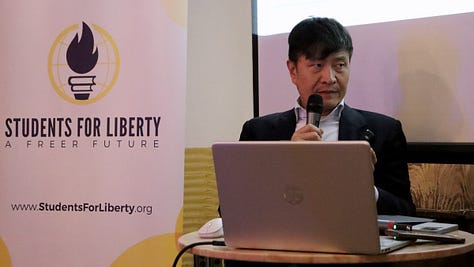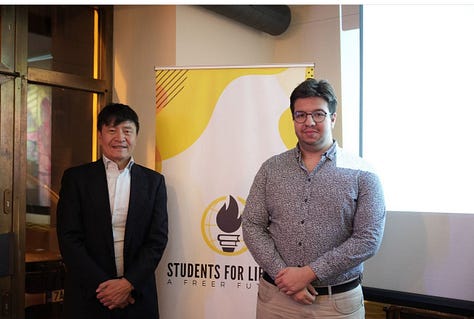In Prague speech, Zhou urges the EU to reassess its economic and strategic dependencies on China
Zhou Fengsuo, Executive Director of Human Rights in China, spoke last week at an event by the Czech Students for Liberty in Prague. Zhou recounted the fateful decision by Deng Xiaoping to deploy tanks into Tiananmen Square on 4 June 1989, where hundreds of thousands of unarmed Chinese citizens had gathered to peacefully demand political reform. Zhou described the rage he felt at that moment—a moment that has defined his lifelong fight for justice and human rights.
Zhou emphasized that the Chinese leadership’s decision in 1989 marked an irreversible turning point in history. By choosing to massacre its own citizens, the Chinese Communist Party revealed its true face to the world: one of cold, authoritarian brutality. Yet, despite this harrowing warning, many countries became blinded by the allure of China’s vast markets and cheap labor. Instead of holding the CCP accountable, the international community welcomed into the global order a murderous regime—one which has since grown stronger, more oppressive, and increasingly aggressive.
In his speech, Zhou urged the EU to reassess its economic and strategic dependencies on China. As Beijing’s coercive policies, support for Russia’s war in Ukraine, and disregard for international norms become ever more evident, Europe must carefully weigh the risks of deepening ties with a regime that undermines global stability and democratic values. Zhou highlighted the critical importance of making principled decisions that prioritize security and sovereignty over short-term economic gain.
The event concluded with a dynamic Q&A session, where Zhou engaged with students on topics ranging from the importance of human rights advocacy to great power competition, and the future of U.S.-China relations, particularly under Trump 2.0. He inspired the audience to think critically about the world they will inherit and to take personal action in addressing the challenges of our time.
Zhou left the students with an empowering message: staying true to one’s cause, no matter the adversity, is the foundation of meaningful change. For young leaders, this sense of duty and commitment is more important now than ever.






